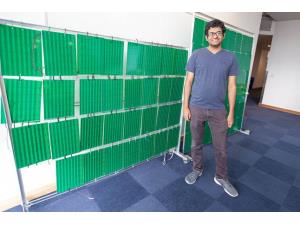There’s a problem with stuffing wireless connections into ever-smaller devices: they can struggle to maintain a good signal when there’s so little space for antennas. MIT CSAIL researchers might have a fix, though. They’ve developed an RFocus “smart surface” that “can work both as a mirror or a lens” to focus radio signals onto the right devices on either side of the “fence.” In return, this improves the median signal strength by nearly 10 times, while doubling the median channel capacity in an office environment.
Instead of just a handful of monolithic antennas, the RFocus prototype revolves around 3,000-plus tiny antennas with software that arranges them to maximize reception. In other words, RFocus is acting as a beamforming controller in the middle, as opposed to letting the radio endpoints — transmitters and client devices — manage this activity, which would be difficult to implement on tiny devices.
The array would be relatively inexpensive at just a few cents per antenna, and it would consume little power compared to a conventional system. Despite the near-tenfold improvement, RFocus doesn’t actually use any signal amplification, meaning the antennas themselves don’t emit power.
There’s no mention of how soon you could expect RFocus in use. The team would not only have to refine the design, but find a way to produce it at scale — ideally in the form of an “inexpensive thin ‘wallpaper'” with no wiring required. The uses are already clear, at least. At a minimum, this could provide stronger, longer-ranged connections for everything from WiFi to notoriously finicky high-band 5G. However, this may be most useful for Internet of Things devices that are either too small to have a wireless link or need some additional bulk to maintain reliable signals. You could see wireless data in more devices, or more elegant versions of the gadgets you already have.


